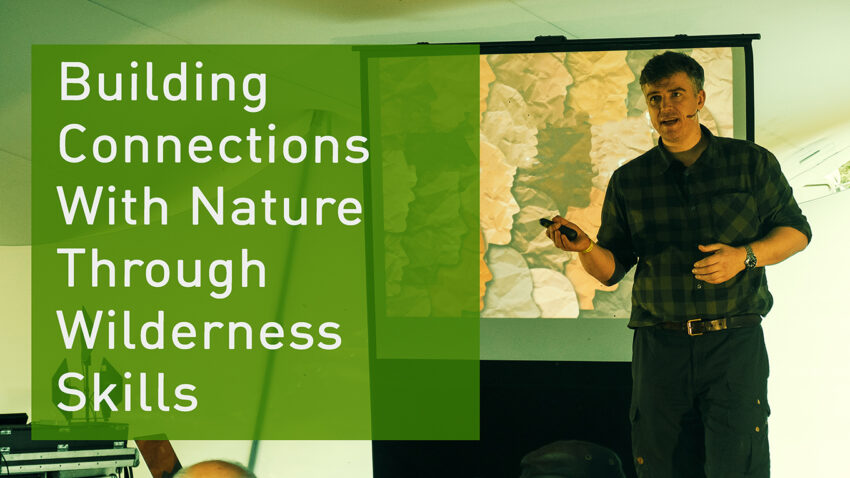
Building Connections With Nature Through Wilderness Skills
This presentation was given to the main stage audience at the 2021 Great Outdoors Festival in the U.K. I’ve edited my presentation slides and photos into the video footage. I hope you enjoy the presentation and find it thought-provoking.
With around 80% of the population of the developed world living in urban or suburban environments, connetion with nature is not automatic, or a given.
Despite this, many people crave an active connection with the natural world. To this end, however, there seem to be some “rules” around what is acceptable and what is not.
The aim of this presentation was to explore some commonly held beliefs and accepted wisdom, and see how these concepts fit together, or don’t.
In particular, I wanted to explore how a modern person utilising wilderness skills can build strong and active connections with the nature, despite this not sitting as comfortably as it might with some of the modern outdoor credos.
Let me know below what you think.
As for the Great Outdoors Festival, this was a really nice, well-organised event. Thanks to the organisers for the invitation to talk and thanks to those present for being an attentive and engaged audience. It was also great to catch up with a whole raft of people who I’ve not seen for ages or who I previously only knew online. Here’s to more of these gatherings….
Related Material on Paul Kirtley’s website:
The Value Of Using Wilderness Skills Closer To Home: Bushcraft Show 2016 Presentation
How To Accelerate Your Bushcraft Learning
The Difference Between Foraging and Living Off the Land
PK Podcast 22: Conversations From Bushcraftfestivalen
Medicinal Use Of Balsam Fir For Cuts, Grazes & Sores
European Alternatives To Balsam Fir For Medicinal Purposes
Water Mint, Mentha aquatica – A Not So Wild Tea
Get my Wilderness Axe Skills Book
Signed copies of my book, Wilderness Axe Skills and Campcraft are available at… wildernessaxeskills.com

9 thoughts on “Building Connections With Nature Through Wilderness Skills”
A really nice and enlightening presentation about how we need to with nature re-engage. Thank for sharing.
many thanks, enjoyed the talk
I fully agree that treating plants around us as resources leads to treating them with much more respect. I believe nobody cares as much about my favorite foraging spots as I do. Great presentation, thank you, Paul
Enjoyed the talk. Already shared this link with you but others may enjoy as well.
https://www.tvo.org/video/documentaries/borealis
I really enjoyed this talk, Paul.
Thanks so much for sharing!
Paul, you certainly have a large amount of experience. Really enjoyed reviewing your presentation. Having grown up in Alaska, the experiences you present are very appropriate to that marvelous outdoors vastness. Nice presentation and great advice.
Hi Paul,
I’ve watched this many times, I just think it was a great presentation to a wide audience, and bunny was amazing ❤️❤️ , you know what I mean ☕️☕️
Hi Paul, Marcel here.
Very relevant presentation for these days. My two cents worth:
I believe that the earth depends on us to exist. After all, once we die, our bodies return to the minerals that the earth holds. But, before we die, we also fertilize it with our excrements, as all animals do, except, now, we humans decided to purify and recycle it on our own through mechanical means. Still, we are what we eat. Therefore, the animals, fish, plants, vegetables, fruit, etc, become us, and we ought to be grateful for their life giving nutrition. We ought to also realize we will feed them eventually as well. But, we feed on each other. It’s not evil, it’s just nature.
As for fire. Learning primitive fire methods allows us to appreciate what nature provides, the type of fuel, its characteristics, and also, the volatility of the fuel in dry conditions. A single spark can destroy an entire forest. An unattended fire can be taken by the wind. A carelessly placed fire can burn roots that smoulder for up to months underground, only to surface and devastate the environment.
The LNT movement should remain in their living rooms, pressing buttons, watching an artificial viewscreen, smelling artificial scents made from a laboratory somewhere. They have no values. Once we taste nature, experience it, we know we are part of it, we belong in it, and we treat it with respect.
Cheers Paul
Hi Marcel,
It’s been a while but it’s good to hear from you here! 🙂
You have some good perspectives here, which resonate with me.
I particularly like your closing comment “Once we taste nature, experience it, we know we are part of it, we belong in it, and we treat it with respect.” So true.
Warm regards,
Paul